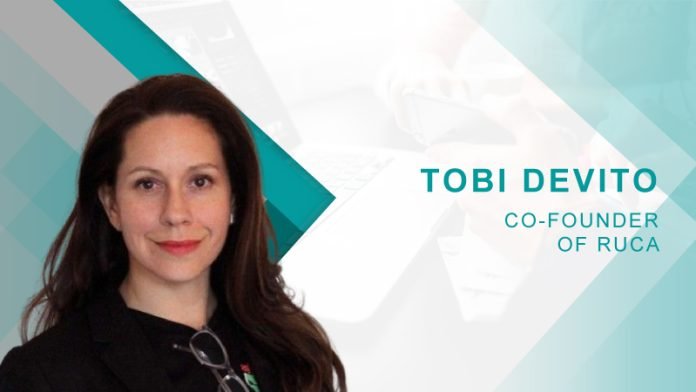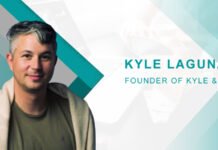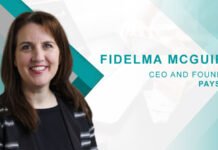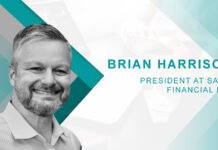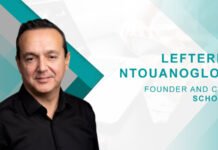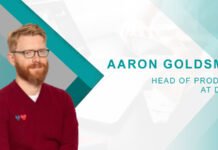Tobi, Welcome to HRTech Cube! Can you tell us a bit about your professional journey? What brought you to co-found Ruca, and how has the experience shaped you?
Thanks! I entered the workforce in 1998 initially focusing on fundraising for non-profit companies. While I cared deeply about the causes I was working for, I wasn’t being fulfilled professionally as a fundraiser. In 2005, I transitioned to a performance-driven marketing firm, marking a pivotal career shift. This role allowed me to acquire new skills and embrace upward mobility, which was exactly what I was seeking.
The birth of my son in 2008 was a turning point in my career path. I personally faced the lack of support that primary caregivers often receive within traditional agencies. This gap continued upon joining a design agency in 2013. It was at this agency where I met some of the most talented and creative people in the industry, including Chris Zeunstrom and Nolan Cabeje, who would eventually become my Co-Founders of Ruca. Although it took a few more years, our common belief that the traditional agency model was burdened with hierarchies, egos, and unrealistic expectations ultimately brought us together to create Ruca.
Ruca is a creative design cooperative by and for makers, creators, and doers. Our flexible style of collaboration drives our efficiency, allowing us to focus on doing beautiful work with fantastic people. Our global collective now includes over 150 creatives across 16 countries, many of whom are caregivers for the young (and old!) loved ones in our lives.
With remote work becoming the norm, especially in marketing, how do you see this trend playing out for creative teams like yours at Ruca?
At Ruca, we were embracing remote work well before the pandemic, as we’ve always believed that borders and location shouldn’t get in the way of working with the best talent. Our team is spread across multiple countries, and this geographical variety brings unique perspectives and ideas to the table. While remote work may keep us away from being in the same room together, it offers the opportunity to tap into a diverse talent pool fostering a more inclusive environment. On any one project, we may have a UX designer in Chicago, visual designer in Barcelona, writer in New York, and engineers in Nepal. An in-office, or even hybrid model, would never be able to compile this level of top talent on one team.
To make teams located across the globe work well with clients, all project teams agree to work the same time zone, when possible. Slack, Figma, and Google Workspace make asynchronous collaboration fast and efficient. And since we know that in person relationships are key in our business, regular meet ups with our clients are always welcome and offer a chance to get out of our homes from time to time!
Ruca is known for shaking up the traditional agency model. How do you guys manage to cut out the overhead and still foster strong collaboration?
Our overhead at Ruca is low by design—no physical office leases, no org charts, and no holding companies demanding profitability targets. This allows us to make the lightest possible footprint on the physical world. In addition to promoting a sustainable future, it also allows us to adapt swiftly and freely to the world around us, without being anchored to the changing tides in global trends and markets. The past few years have been a rollercoaster, with lots of agencies and other collectives laying off swaths of talent, closing their doors, or succumbing to PE buyouts.
By forgoing traditional hierarchies, we’re more agile and responsive. While 2023 and 2024 may have been a wild ride for Ruca, our flexible model has allowed us to bend but not break with the volatility. Without the constraints of rigid structures, we can also foster a more collaborative and innovative environment, empowering team members to take ownership of their work. This results in an empowered and dynamic team capable of delivering high-quality results without the typical agency bloat.
Working remotely can be tricky for creative teams. How does Ruca keep the creativity and teamwork flowing, even when you’re not in the same room?
As a referral only network, we maintain the highest quality of talent in our co-op. With an average of 12 years of professional experience, all members of our collective are “doers not reviewers” here at Ruca. We give voice and opportunity to these highly motivated and aspirational makers to create without their work getting watered down—or “designed by a committee”—before the client sees it.
This trust and autonomy, regardless of location, keep creativity at the forefront, while the chance to collaborate with other like-minded and equally talented folks keeps people coming to and staying with Ruca for the long run.
I know Ruca loves working with startups to drive innovation. What’s your approach to finding the right startups to partner with?
We like to partner with founders of early-stage startups who are still sorting out their product-market fit, where a little support can go a long way. Having been there before, we know how helpful a bit of time, expertise, and even financial investment can be to new ideas deserving of love and attention.
In less than three years, our investments have fueled a fascinating range of innovations and one acquisition.. They’re also something our Fortune 500 friends love to hear about—and sometimes get involved in—bringing our services work and ventures together to create maximum value.
- Founders who are good people solving problems they deeply understand.
- Companies that have the potential for good, and society needs it.
- An unquantified or unexpected special sauce (we gotta keep some secrets to our success to ourselves!
Innovation is great, but practicality matters too. How do you balance pushing creative boundaries while making sure the work is still effective for your clients?
We approach each project with a product mindset, which means we focus first on the problem brought to us by our clients to be solved through design rather than immediately jumping to shiny, flashing solutions. While we often end up with a beautiful end state, we can always trust that it’s grounded in our clients’ business goals and customer needs. We use design to solve our clients’ big problems, not to stroke our own egos.
Since our diverse network of creatives spans brand, marketing, digital, and product, we always bring the best team to the table. We have no “bench” and no billability targets to meet. Just a team of interdisciplinary folks looking to solve the problem at hand.
And, this mindset works! 80% of our clients return for a second (or third, or fourth!) project.
What’s your personal strategy for staying ahead in such a fast-changing industry? Any habits or practices that keep you on your toes?
After a many years of scouring books, clogging my inbox with newsletters, and doom-scrolling on LinkedIn to “stay up to date” on trends, I’ve found that the best way to remain relevant in this industry is to listen way more than I talk (which for this New Yorker is a very, very hard thing to do).
I’ve made a habit of surrounding myself with clients, creatives, and my Co-Founders whose skills, knowledge, and talents differ (and typically exceed) my own. This way, every conference call, coffee, or even Slack message is a chance for me to learn, grow, and see things in a new light.
For those looking to start their own ventures in the creative space, what advice would you give? Are there any lessons from Ruca that you think would be particularly helpful?
I’d say, you don’t have to create something brand new for it to be a “good” idea. It’s a well-known adage, but the guys at Google didn’t set out to make a new product. They saw a sub-par product that existed —in this case, search engines— and knew they could make a better one. I hear from entrepreneurs all the time that they are building the first “name your unimaginable new product here.” But more times than not, the reason that product doesn’t already exist is because there’s no demand for it.
Similar to how we approach our services work, we also approach our ventures and even our own cooperative model, with a product mindset. We aren’t trying to create something brand new here. We see how things are built today, and know that we can make them better in the future, for our clients, start ups, and ourselves.
Where do you see creative collaboration heading in the next few years? How do you see Ruca fitting into that future?
With more and more agencies getting swallowed up by large holding companies or PE buyouts, I see unique and inspired points of views getting watered down in a sea of sameness. Ten or even five years ago, we’d lose a job to a competitor and the feedback we’d receive was like, “The guys who won had something truly differentiated to offer.” But now, everyone is starting to look and sound exactly the same. Often, the biggest decision factor is cost, which we all know is the worst reason to choose a partner.
However, an exciting trend we’re witnessing is the rise of small, independent studios, like Ruca. These shops continue to be committed to their craft and are cranking out some truly inspired and brilliant work. We often team with these other shops on projects or accounts, bringing a bigger, better level of expertise to the table to deliver really kick-ass work.
Before we wrap up, do you have any final thoughts on the future of work, creativity, or entrepreneurship you’d like to share?
As an entrepreneur, there are often more downs than ups, but I’m a strong believer that growth only happens in struggle. In March 2020, we were collectively handed one of the greatest hardships any of us will ever face in our lives, personally and professionally. Despite some very difficult and sad times, I experienced some pretty wonderful gifts that I would not have been afforded had the pandemic not happened.
The greatest gift was personal. Alongside the tears and scuttles, I got to know my then pre-teen son better than I could have ever imagined. He’s rad. If you ever get the chance to know him, consider yourself lucky.
The second greatest gift was joining Chris, Nolan, and Dimitri (our Operations Co-Founder) to help build something I truly believe in. While the past 4 years have presented some gnarly challenges, we have collectively used these times to strengthen our model and improve our ways of working. Coming into 2024 we’ve:
1) Become better at assessing the right types of clients for Ruca.
2) Asked for more help from trusted people in our network to run and grow Ruca.
3) Shored up our operational and financial practices, putting us in a better position as an organization now than we were before the pandemic
And we’re not done! We’ve got a lot of learning, growing, and improving to still do.

Tobi DeVito Co-Founder of Ruca
Tobi Devito is the Co-Founder and Head of Services at Ruca, a full-service global design cooperative. Since August 2020, she has managed Ruca’s service operations, including service strategies, delivery teams, process optimizations, and client relationships. She previously served as Product Strategist at Ruca and shaped the strategic direction of projects, defined goals and made strategic adjustments to optimize outcomes. Additionally, Tobi founded My Bird Digital in February 2018 where she provided product and digital consulting services specializing in enterprise platforms and solutions. Earlier in her career, Tobi was the Director of Product Management at VSA Partners, Inc. (2015-2018), where she led solution innovation, product management, and agile teams, breaking down silos between branding, marketing, product, and advertising. Tobi began her career in non-profits, including roles at Planned Parenthood and amFAR. Tobi holds a Masters in Public Administration from NYU Robert F. Wagner Graduate School of Public Service. She is based in New York.
